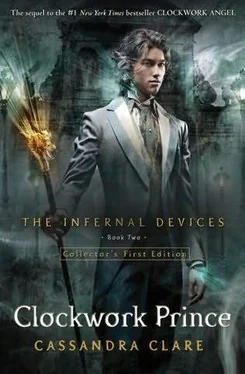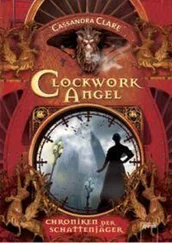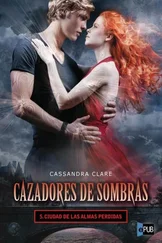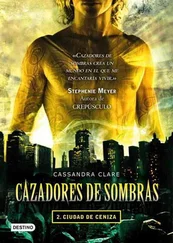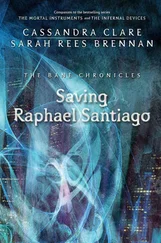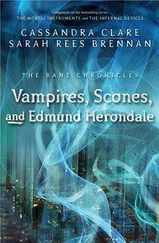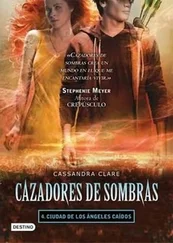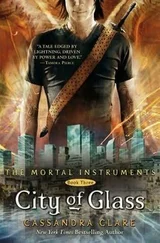She whirled away from the glass, shaking her head. How had she not thought of that before? And yet the mere idea seemed like a betrayal of her own face. Her hunger to know what she was still burned inside her; if even her own features were no longer the ones she’d been born with, how could she justify this demand, this need to know her own nature? Don’t you know there is no Tessa Gray? Mortmain had said to her. If she used her power to turn her eyes sky blue or to darken her lashes, wouldn’t she be proving him right?
She shook her head, trying to cast the thoughts off as she hurried from her room and down the steps to the Institute’s entryway. Waiting in the courtyard was a black carriage, unmarked by any coat of arms and driven by a pair of matched horses the color of smoke. In the driver’s seat sat a Silent Brother; it was not Brother Enoch but another of his brethren that she didn’t recognize. His face was not as scarred as Enoch’s, from what she could see beneath the hood.
She started down the steps just as the door opened behind her and Jem came out; it was chilly, and he wore a light gray coat that made his hair and eyes look more silver than ever. He looked up at the equally gray sky, heavy with black-edged clouds, and said, “We’d better get into the carriage before it starts to rain.”
It was a perfectly ordinary thing to say, but Tessa was struck speechless all the same. She followed Jem silently to the carriage and allowed him to help her in. As he climbed in after her, and swung the door shut behind them, she noticed he was not carrying his sword-cane.
The carriage started forward with a lurch. Tessa, her hand at the window, gave a cry. “The gates—they’re locked! The carriage—”
“Hush.” Jem put his hand on her arm. She couldn’t help a gasp as the carriage rumbled up to the padlocked iron gates—and passed through them, as if they had been made of no more substance than air. She felt the breath go out of her in a whoosh of surprise. “The Silent Brothers have strange magic,” said Jem, and dropped his hand.
At that moment it began to rain, the sky opening up like a punctured hot water bottle. Through the sheets of silver Tessa stared as the carriage rolled through pedestrians as if they were ghosts, slipped into the narrowest cracks between buildings, rattled through a courtyard and then a warehouse, boxes all about them, and emerged finally on the Embankment, itself slick and wet with rain beside the heaving gray water of the Thames.
“Oh, dear God,” Tessa said, and drew the curtain shut. “Tell me we aren’t going to roll into the river.”
Jem laughed. Even through her shock, it was a welcome sound. “No. The carriages of the Silent City travel only on land, as far as I know, though that travel is peculiar. It’s a bit sickening the first time or two, but you get used to it.”
“Do you?” She looked at him directly. This was the moment. She had to say it, before their friendship suffered further. Before there could be more awkwardness. “Jem,” she said.
“Yes?”
“I—you must know—how very much your friendship means to me,” she began, awkwardly. “And—”
A look of pain flashed across his face. “Please don’t.”
Thrown off her stride, Tessa could only blink. “What do you mean?”
“Every time you say that word, ‘friendship,’ it goes into me like a knife,” he said. “To be friends is a beautiful thing, Tessa, and I do not scorn it, but I have hoped for a long time now that we might be more than friends. And then I had thought after the other night that perhaps my hopes were not in vain. But now—”
“Now I have ruined everything,” she whispered. “I am so sorry.”
He looked toward the window; she could sense that he was fighting some strong emotion. “You should not have to apologize for not returning my feelings.”
“But Jem .” She was bewildered, and could think only of taking his pain away, of making him feel less hurt. “I was apologizing for my behavior that other night. It was forward and inexcusable. What you must think of me . . .”
He looked up in surprise. “Tessa, you can’t think that, can you? It is I who have behaved inexcusably. I have barely been able to look at you since, thinking how much you must despise me—”
“I could never despise you,” she said. “I have never met anyone as kind and good as you are. I thought it was you who were dismayed by me. That you despised me.”
Jem looked shocked. “How could I despise you when it was my own distraction that led to what happened between us? If I had not been in such a desperate state, I would have shown more restraint.”
He means he would have had enough restraint to stop me , Tessa thought. He does not expect propriety of me. He assumes it would not be in my nature. She stared fixedly at the window again, or the bit of it she could see. The river was visible, black boats bobbing on the tide, the rain mixing with the river.
“Tessa.” He scrambled across the carriage so that he was sitting beside her rather than across from her, his anxious, beautiful face close to hers. “I know that mundane girls are taught that it is their responsibility not to tempt men. That men are weak and women must restrain them. I assure you, Shadowhunter mores are different. More equal. It was our equal choice to do—what we did.”
She stared at him. He was so kind, she thought. He seemed to read the fears in her heart and move to dispel them before she could speak them aloud.
She thought then of Will. Of what had transpired between them the previous evening. She pushed away the memory of the cold air all around them, the heat between their bodies as they clung together. She had been drugged, as had he. Nothing they had said or done meant anything more than an opium addict’s babbling. There was no need to tell anyone; it had meant nothing. Nothing.
“Say something, Tessa.” Jem’s voice shook. “I fear that you think that I regret that night. I do not.” His thumb brushed over her wrist, the bare skin between the cuff of her dress and her glove. “I only regret that it came too soon. I—I would have wanted to—to court you first. To take you driving, with a chaperon.”
“A chaperon?” Tessa laughed despite herself.
He went on determinedly. “To tell you of my feelings first, before I showed them. To write poetry for you—”
“You don’t even like poetry,” Tessa said, her voice catching on a half laugh of relief.
“No. But you make me want to write it. Does that not count for anything?”
Tessa’s lips curled into a smile. She leaned forward and looked up into his face, so close to hers that she could make out each individual silvery eyelash on his lids, the faint white scars on his pale throat where once there had been Marks. “That sounds almost practiced, James Carstairs. How many girls have you made swoon with that observation?”
“There is only one girl I care to make swoon,” he said. “The question is, does she?”
She smiled at him. “She does.”
A moment later—she did not know how it had happened—he was kissing her, his lips soft on hers, his hand rising to cup her cheek and chin, holding her face steady. Tessa heard a light crinkling and realized it was the sound of the silk flowers on her hat being crushed against the side of the carriage as his body pressed hers back. She clutched at his coat lapels, as much to keep him close as to stop herself from falling over.
The carriage came to a jerking halt. Jem drew back from her, looking dazed. “By the Angel,” he said. “Perhaps we do need a chaperon.”
Tessa shook her head. “Jem, I . . .”
Jem still looked stunned. “I think I’d better sit over here,” he said, and moved to the seat across from hers. Tessa glanced toward the window. Through the gap in the curtains she saw that the Houses of Parliament loomed above them, towers framed darkly against the lightening sky. It had stopped raining. She was not sure why the carriage had stopped; indeed, it rumbled into life a moment later, rolling directly into what seemed a pit of black shadow that had opened up before them. She knew enough not to gasp in surprise this time; there was darkness, and then they rolled out into the great room of black basalt lit with torches that she remembered from the Council meeting.
Читать дальше
